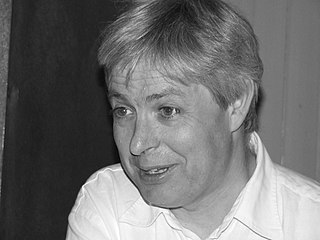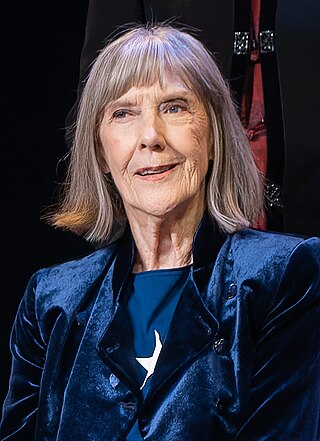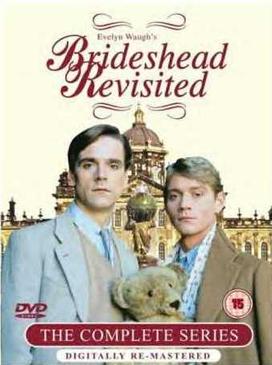
David Alan Mamet is an American playwright, filmmaker, and author. He won a Pulitzer Prize and received Tony nominations for his plays Glengarry Glen Ross (1984) and Speed-the-Plow (1988). He first gained critical acclaim for a trio of off-Broadway 1970s plays: The Duck Variations, Sexual Perversity in Chicago, and American Buffalo. His plays Race and The Penitent, respectively, opened on Broadway in 2009 and previewed off-Broadway in 2017.

Sir Tom Stoppard is a Czech-born British playwright and screenwriter. He has written for film, radio, stage, and television, finding prominence with plays. His work covers the themes of human rights, censorship, and political freedom, often delving into the deeper philosophical thematics of society. Stoppard has been a playwright of the National Theatre and is one of the most internationally performed dramatists of his generation. He was knighted for his contribution to theatre by Queen Elizabeth II in 1997.

Jonathan Coe is an English novelist and writer. His work has an underlying preoccupation with political issues, although this serious engagement is often expressed comically in the form of satire. For example, What a Carve Up! (1994) reworks the plot of an old 1960s spoof horror film of the same name. It is set within the "carve up" of the UK's resources that was carried out by Margaret Thatcher's Conservative governments of the 1980s.

Sir David Rippon Hare is an English playwright, screenwriter and theatre director. Best known for his stage work, Hare has also enjoyed great success with films, receiving two Academy Award nominations for Best Adapted Screenplay for writing The Hoursin 2002, based on the novel written by Michael Cunningham, and The Readerin 2008, based on the novel of the same name written by Bernhard Schlink.

Mark Gatiss is an English actor, comedian, screenwriter, director, producer and novelist. He is best known for his work in television acting in and co-creating shows with Steven Moffat. Gatiss has received several awards including a BAFTA TV Award, a Primetime Emmy Award, a Peabody Award, and two Laurence Olivier Awards.

Thomas Nigel Kneale was a Manx screenwriter who wrote professionally for more than 50 years, was a winner of the Somerset Maugham Award, and was twice nominated for the BAFTA Award for Best British Screenplay.

Paul Abbott is an English screenwriter and producer. He became one of the most successful television writers in Britain following his work on popular series such as Cracker (1993–2006) and Coronation Street (1960–present), and would become more widely known for creating some of the most acclaimed television dramas of the 1990s and 2000s, including Reckless (1997), Touching Evil (1997–1999), Clocking Off (2000–2003), State of Play (2003), Shameless (2004–2013), and No Offence (2015–2018).

Dame Eileen June Atkins, is an English actress and occasional screenwriter. She has worked in the theatre, film, and television consistently since 1953. In 2008, she won the BAFTA TV Award for Best Actress and the Emmy Award for Outstanding Supporting Actress in a Miniseries or Movie for Cranford. She is also a three-time Olivier Award winner, winning Best Supporting Performance in 1988 and Best Actress for The Unexpected Man (1999) and Honour (2004). She was appointed Commander of the Order of the British Empire (CBE) in 1990 and Dame Commander of the Order of the British Empire (DBE) in 2001.
Brian Leonard Hayles was an English television and film writer, most notably for the BBC science fiction series Doctor Who.
Melvin Barry Hines, FRSL was an English author, playwright and screenwriter. His novels and screenplays explore the political and economic struggles of working-class Northern England, particularly in his native West Riding/South Yorkshire.

Jesse David Armstrong is a British screenwriter and producer. He is known for writing for a string of several critically acclaimed British comedy series as well as satirical dramas. He has received numerous accolades including a BAFTA Award, three Golden Globe Awards, and seven Primetime Emmy Awards as well as a nomination for an Academy Award.
Ashley Pharoah is a British screenwriter and television producer. He is best known as the co-creator/writer of the successful drama series Life on Mars, which began on BBC One in 2006, and creator/writer of the family drama Wild at Heart, which aired on ITV1 from 2006 until 2012.
Charles Gerald Wood was a playwright and scriptwriter for radio, television, and film. He lived in England.
Dennis Kelly is a British writer and producer. He has worked for theatre, television and film.

Heidi Thomas is an English screenwriter and playwright.

Brideshead Revisited is a 1981 British television serial starring Jeremy Irons and Anthony Andrews. It was produced by Granada Television for broadcast by the ITV network. Significant elements of it were directed by Michael Lindsay-Hogg, who handled the initial phases of the production, before Charles Sturridge carried on with the series. The first episode is credited to both men equally.
Irene Shubik was a British television producer and story editor, known for her contribution to the development of the single play in British television drama. Beginning her career in television at ABC Weekend TV, she worked on Armchair Theatre as a story editor, where she devised the science fiction anthology series Out of this World.
Andrew Timothy Birkin is an English screenwriter and director.
Christine Langan is an English film producer who was appointed Head of BBC Films in 2009. In 2016, she left the role to become CEO of comedy television production company Baby Cow Productions.

Steven Knight is a British screenwriter, film and television producer and director. Knight wrote the screenplays for the films Closed Circuit, Dirty Pretty Things, and Eastern Promises, and also wrote and directed the films Locke and Hummingbird.












